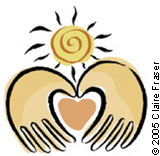
If you think effective stress relief comes with a big price tag, think again.
Fam Pract Manag. 2005;12(5):102

Often when we think of stress management, we envision exotic vacations, marathon massages and abbreviated work schedules. All of these have their place, but some of the most powerful stress management exercises involve self-reflection. The following are a few of my favorites:
Be true to yourself. We all have core values that we can't abandon without feeling out of sync. If you aren't sure what yours are, try sitting down, brainstorming, creating a list and posting it in a prominent place. When we don't adhere to these values, we feel uneasy, and normal stress relief techniques might not help us. If you value empathy and understanding, all the relaxation time in the world won't settle the angst you will feel when trying to squeeze a patient into a five-minute time slot. If you value family time, 10 sessions of yoga won't help you if they require missing dinner at home with your children.
Know your limitations. You probably have some patients who focus their eyes on you while waiting for the definitive answer to their maladies. They view you as a hero who lacks the fallibility of ordinary mortals. If you buy into their fantasy of your omnipotence, you lower your resistance to stress. However, if you embrace your humanity and the imperfections that come with it, you can create an inner environment of peace, healing and resilience.
Think outside the box. Sometimes stress management requires a creative approach. For example, I recently suggested to a little boy with a bedwetting problem that before he falls asleep at night, he could talk to the part of his brain in charge of his bladder and ask it to keep him dry. He was delighted to find clean sheets when he got up in the morning. When you feel stressed, ask your creative side to devise an innovative solution to your problems as you slumber. You will be intrigued with the new insights that emerge when you least expect it.
Attend to your basic needs. Just as you provide continuing education to your professional side, honor your primitive side with regular forays into a simpler world. Ten minutes wrapped in a blanket warm from the dryer with fingers curled around a hot mug of cider can soothe the emotion-regulating centers of the brain better than any technique I know. Alternatively, a brief series of deep breaths while imagining the warmth infusing your heart, mind and spirit can serve you as well. Read a story you enjoyed as a child, express emotion artistically with paint or chalk, or chase your dog in the park.
Laugh … then laugh some more. One of the greatest paradoxes of humanity must be that as sacred as life is, the dilemmas of the body are often points of endless hilarity. As a physician, you shouldn't have to look far for this kind of comic relief, and you don't need me to tell you how good it is for you.
Beware of peer pressure. It doesn't just happen on the school playground. What works for your practice partner may not work for you, but there's a good chance he or she thinks it should. Resist the urge to conform. Create your professional self in your own style. Trying to do and act as others wish will only create more stress.
No appointment necessary
Stress management doesn't have to be an expensive, fleeting trip to the spa. Spending quality time alone or with your family might be just what you need after a long day at the office. It might take a bit of trial-and-error, but you will learn which techniques help you manage your stress. Best of all, you can practice them whenever the time is right for you.